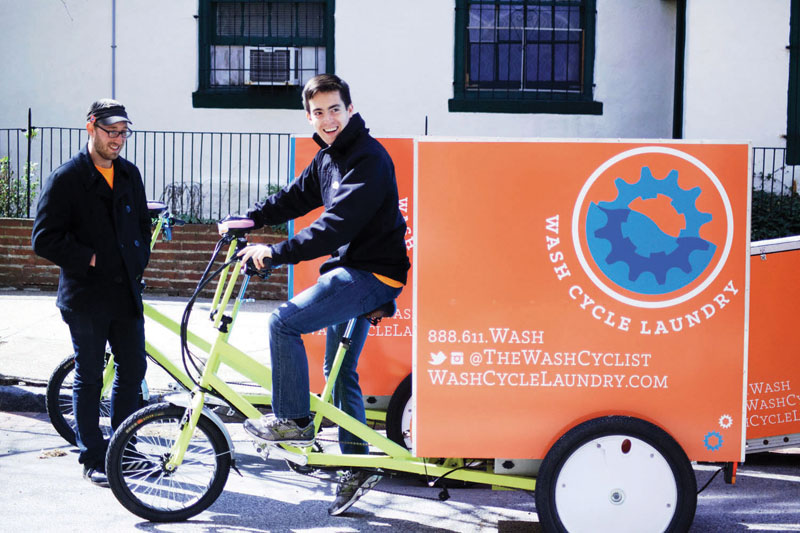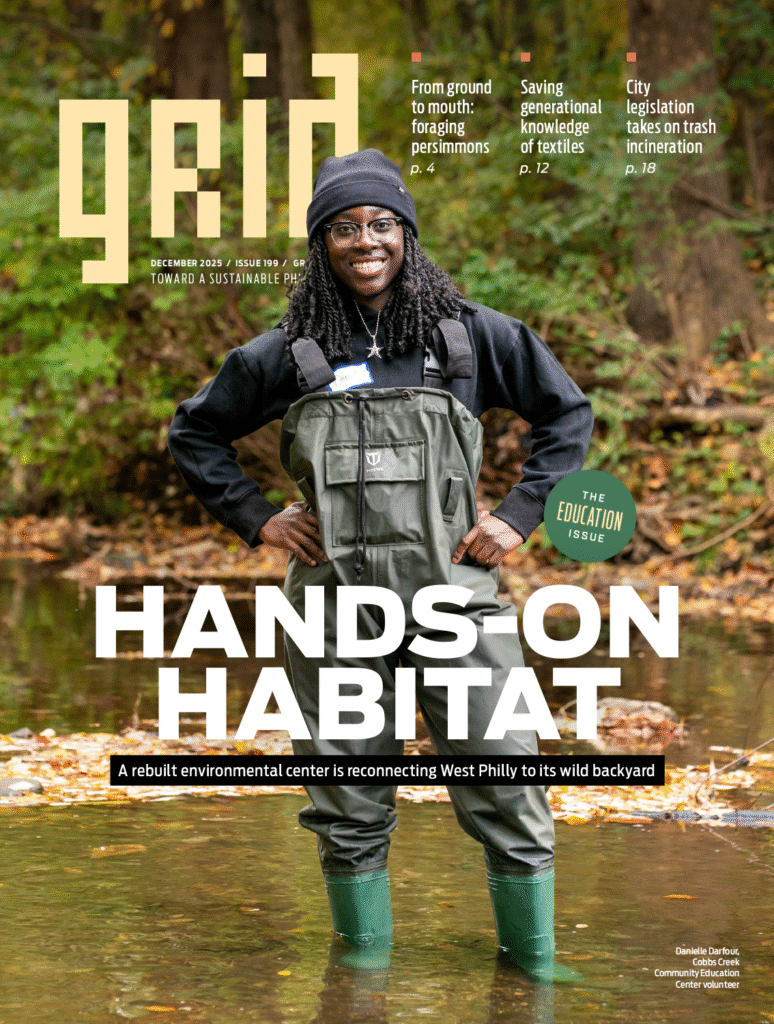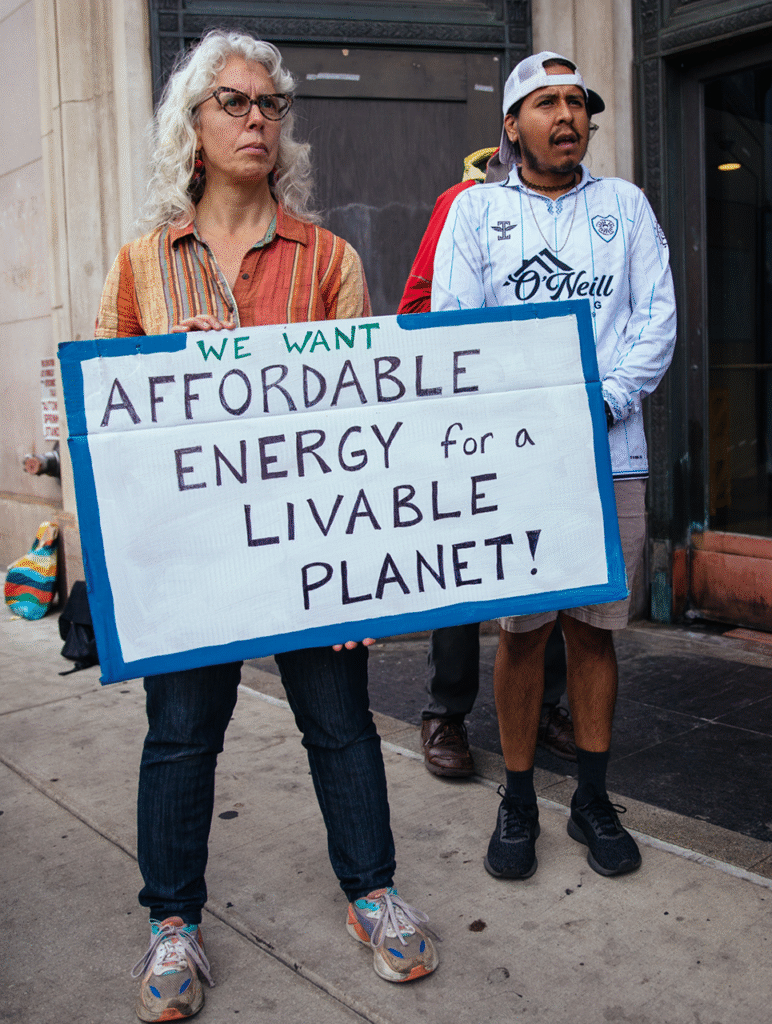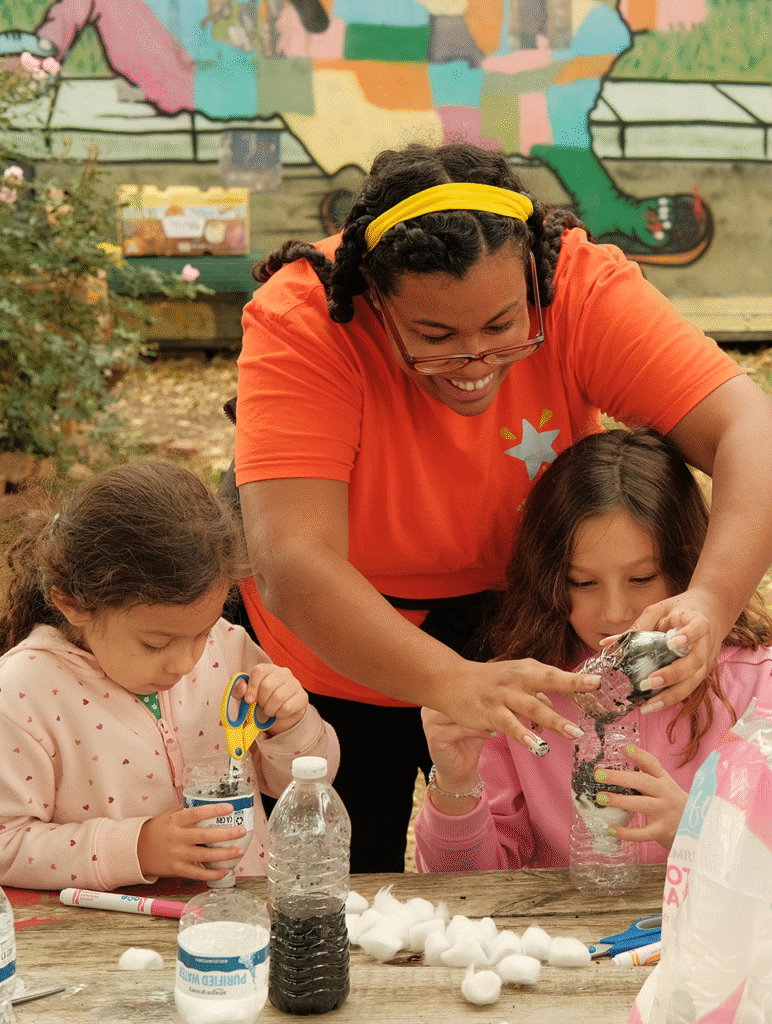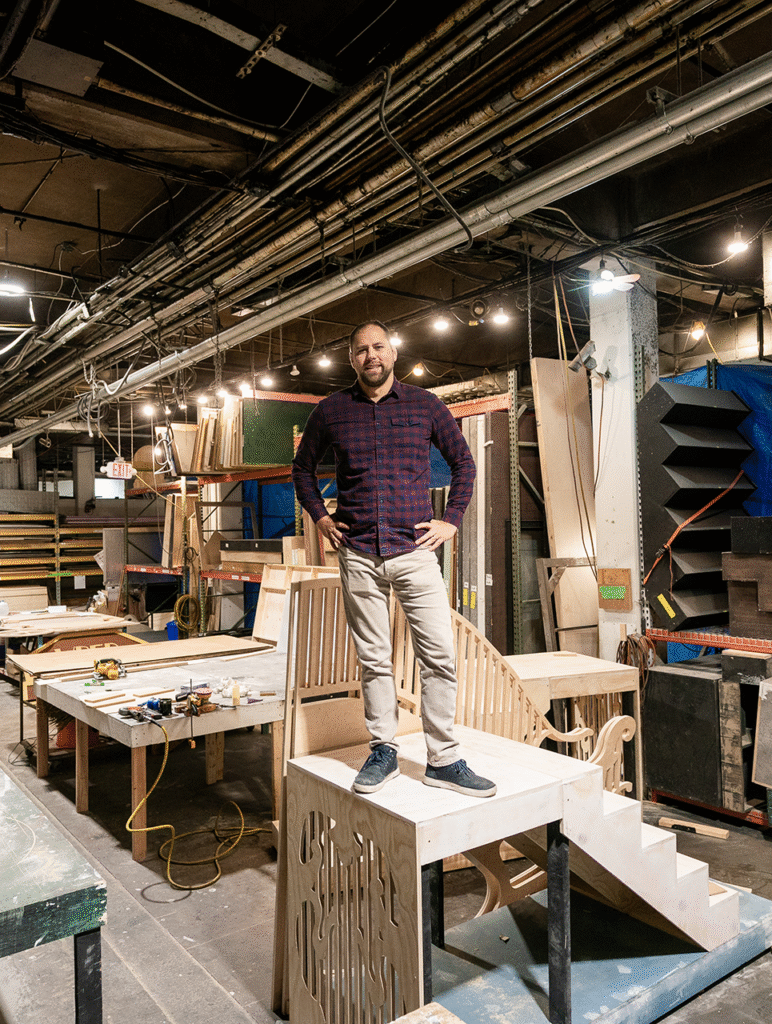Photo by Plate 3 Photography
Mr. Clean
by Marilyn Anthony
When you think of disruption and innovation in business, the gleaming offices of Google may come to mind. But in South Philadelphia, within an ordinary coin-op laundromat at 1611 South Street, a radical business is thriving and expanding nationally.
Armed with a seemingly simple market analysis showing that Philadelphia “had a lot of people who produce a lot of dirty laundry in a bikeable area,” Wash Cycle Laundry founder and CEO Gabriel Mandujano set out to build a socially responsible corporation. The values-based startup would provide clean laundry, but operate the business by committing to two core values. The first and most visible part is to minimize environmental impact using bicycles, not diesel trucks, to transport the laundry.
Less visibly, but even more importantly, to maximize community impact, Wash Cycle offers jobs, training and advancement potential to people facing barriers to meaningful employment.
In October 2010, Wash Cycle began operations in their unprepossessing storefront, and five years later—with $1.5 million in annual revenues, 50 full-time employees, and accounts in Philadelphia, Washington, D.C., and Austin, Texas—Wash Cycle Laundry is a proven business model that has won over hardcore skeptics. After delivering 3.5 million pounds of clean laundry, Wash Cycle is much more than a warm and fuzzy notion.
Zoe McKinley, director of the Blackstone LaunchPad for entrepreneurs at Philadelphia University, defines socially responsible enterprises as “a business venture that addresses environmental and/or social problems through its core mission and operations.” John Moore, president of the Philadelphia chapter of Investors’ Circle, describes Wash Cycle’s social impact values as “baked into the organization.” The more laundry they do, the more they deliver by bikes, multiplying the environmental benefit. The more laundry they do, the more people they provide jobs for, creating greater economic impact.
Mandujano’s business concept might seem both quirky and irresistible to the right investors and consumers, but the company faced daunting challenges to identify and train a labor force, secure funding and develop the technology to track the flow of laundry. Wash Cycle’s startup days are a terrific example of “it takes a village,” says Mandujano, now 32. A graduate of the Wharton School of the University of Pennsylvania, Mandujano never considered building a business anywhere other than Philadelphia.
According to Margaret Berger Bradley, director of the Goldman Sachs 10,000 Small Businesses initiative at the Community College of Philadelphia, Mandujano chose wisely. “We have in our region an extraordinary array of support services for small businesses,” she says. “Whether you’re starting up … or are a more mature business… you don’t have to do it alone.”
Investors’ Circle’s Moore adds, “Social-impact business creation is really getting a lot of momentum in Philly. We have some of the key components that are required to have an early stage ecosystem… and perhaps, most importantly, we have investors who write checks.”
According to Mandujano, one goal for Wash Cycle is “to pioneer a new way of managing people at the bottom end of the service sector.” He believes it is nearly impossible to over invest in the professional development of your front-line staff, even in entry-level positions. Wash Cycle has found few effective off-the-shelf training programs, so they are creating their own—including professional coaching and peer learning circles, innovations not usually associated with laundry workers. This commitment to training pays off. According to Joel Hommes, 34, director of business development for Wash Cycle and its fourth employee, their employee retention rate outperforms other employers who work with former welfare recipients in Pennsylvania by 80 percent. It’s a key metric toward achieving a “triple bottom line” of people, profit and planet.
For assistance identifying suitable employees, Mandujano turned to key partners in labor force development, Philadelphia Works and Gearing Up. Both organizations assist job seekers with skills development and provide a conduit to employers. Gearing Up specifically serves women in transition from addiction or incarceration, encouraging cycling as a means of transportation, employment and wellness.
Mark Edwards, CEO of Philadelphia Works, describes Wash Cycle’s business model as “iconic,” since “the people Gabe wanted to hire are the hardest population to serve.” According to Edwards, 46 percent of Pennsylvanians who receive cash assistance live in Philadelphia County. Edwards feels the five-year partnership with Wash Cycle demonstrates that individuals who are given an opportunity to be trained in a constructive environment can thrive. Wash Cycle’s commitment to its employees “translates into a brand loyalty that, as an employer myself, I envy,” says Edwards.
Numerous early investors helped launch Wash Cycle, but attracting serious social venture capital wasn’t easy. Moore, who now serves on Wash Cycle’s three-member board of directors, was not an early believer. When Wash Cycle approached Investors’ Circle, the oldest and most active social investor group in the world, their initial response was a firm, “No thanks.”
Moore, an avid cyclist, explains the reason behind the initial rejection. “The bicycle part was not hard to understand… [but]as an investor, you look for a company that can grow significantly, and laundry wasn’t a sector… that can give investors the return they’re looking for.”
Unique elements of the business plan helped win over investors and jumpstart growth for Wash Cycle. Mandujano needed OPM, Other People’s Money, but he needed less of it because his business utilized OPL, Other People’s Laundries.
Rather than build his own laundries, Mandujano found existing laundromats willing to lease to Wash Cycle. He dedicated resources to developing their laundry tracking technology and identifying the right equipment for safe, efficient year-round delivery. To be true to their core social mission, Wash Cycle also invested a lot of effort and thought into creating employment opportunities in an industry that is not renowned for them. Mandujano says, “I love bikes, but that’s a practical commitment. I can show the dollars and sense and business metrics that make them a good choice. The social impact… is by far the harder challenge, but one that is more rewarding when we get it right.”
Hommes says he’s keenly aware of how cost and social values play into customers’ purchasing decisions. “The laundry industry offers us an opportunity to be cheaper and greener, and shows that it doesn’t have to add costs to do the right thing.”
Marketing Director Leigh Goldenberg, 33, elaborates that, while residential customers might sign on with Wash Cycle because of the low-impact bike delivery, institutional clients such as universities “can check off a lot of boxes in their sustainability criteria and still save money.”
Wash Cycle’s expansion into Washington, D.C., built on their solid hometown relationships with the University of Pennsylvania and the U.S. Department of Veterans Affairs. George Washington and Georgetown universities signed on as early anchor clients, enabling Wash Cycle to establish a base from which to pursue additional institutional and federal contracts.
Mandujano describes D.C. as a bike-friendly place with “a lot of paint on the street.” It also offers vast potential for federal contracts, a market Wash Cycle feels its business model can serve competitively.
Looking to grow in the southern U.S., Wash C
ycle’s scan of cities favored Austin, Texas, for its business and residential density in a bikeable distance. The warm climate was a factor, too. Without an institutional anchor contract, Wash Cycle moved into this market speculatively. They minimized their risk by identifying affordable facilities and landing numerous contracts with smaller independent businesses such as spas.
Back at the 1611 South Street laundry where it all began, the Wash Cycle Laundry Team of Kwabena Owusu-Ansah, Patricia Hightower, Rosa Isaac and Tracey Martin are “power pushing” through sacks of laundry, working toward a PPOH, “pounds per operating hours” that can earn them a bonus. Washing machines soap hundreds of towels while a wall of dryers tumbles them toasty dry. Consumer Route Cyclist Jason Jenigen wheels his bike trailer onto the sidewalk and unloads an astonishing number of bright yellow WCL sacks onto the shop floor.
Laundry Team Leader Martin, 48, was one of Wash Cycle’s first employees, and she welcomes the chance to talk about her employer. “Gabe is the type of guy who makes you want to be a go-getter. He said one day we’re going to do diapers. It came true. One day we’ll do dry cleaning. It came true. And now we’re in Austin and Washington. I know it’s dirty laundry, but… I like what he’s doing: helping out people who are in distress, people that can’t get a job.”
Owusu-Ansah, 38, had difficulty finding employment until he received janitorial training at Horizon House that led to the opportunity at Wash Cycle.
He takes a break from folding towels to say that it takes “hard work and dedication” to succeed at Wash Cycle, where he has worked for two years. He continues, “but it’s not about the laundry. It’s about that man offering opportunities for people who have a hard time getting opportunities. I’m getting up in the morning and going out and doing something. That’s a good feeling right there. My family is pretty much proud of me.”



